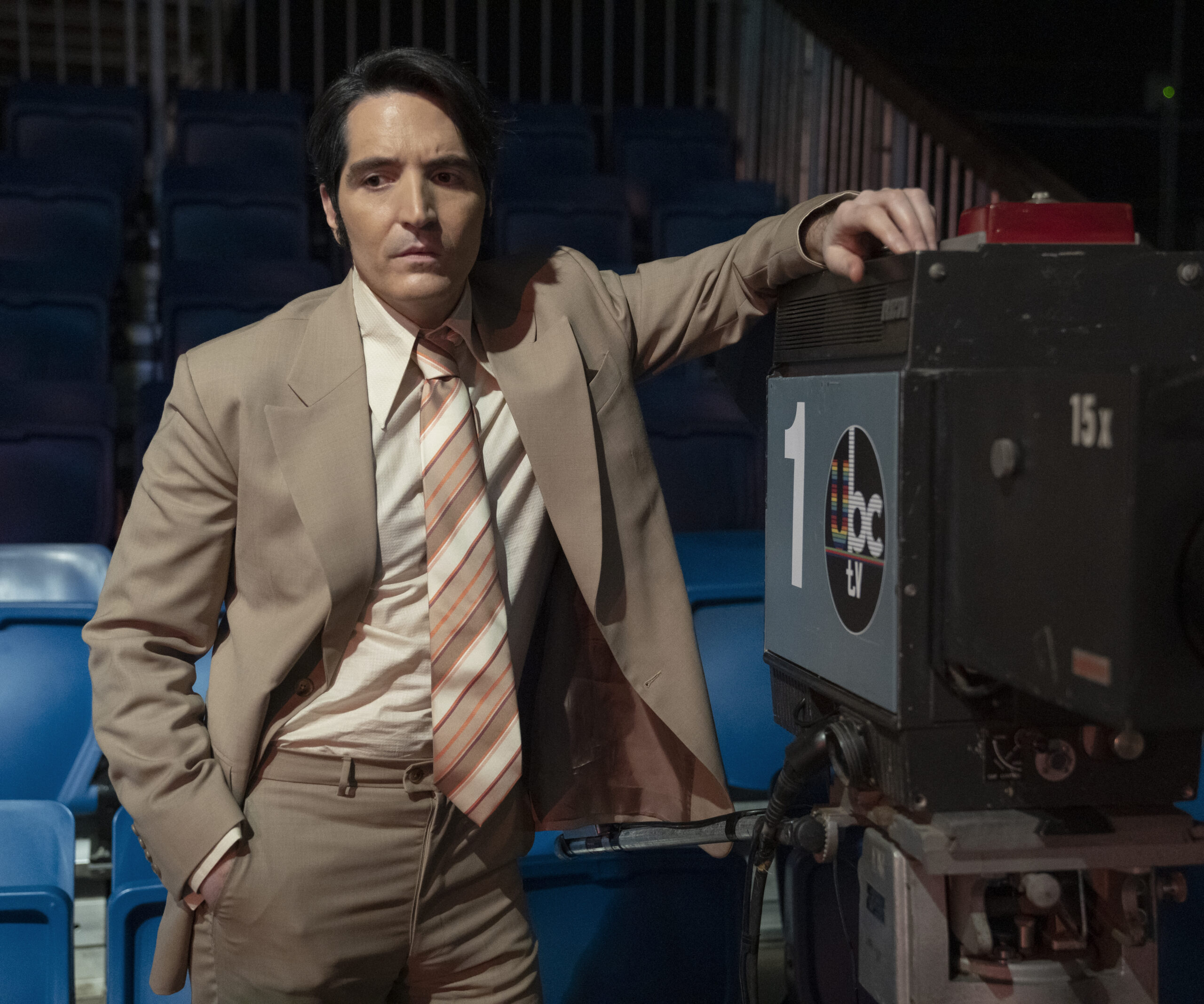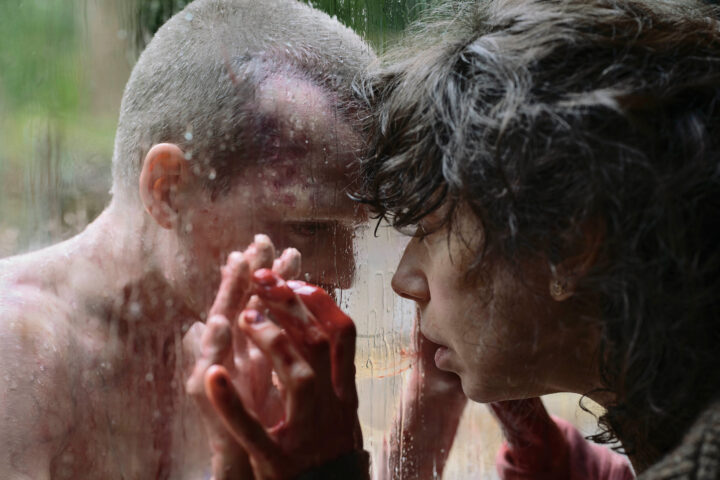In Late Night With the Devil, David Dastmalchian delivers a riveting performance as a 70s-era talk show host whose pursuit of television ratings leads to a chilling supernatural confrontation. His live variety hour takes an enjoyably terrifying turn when what appears to be an on-camera demonic possession sends the broadcast into chaos, captivating then horrifying his audience.
As the popular host Jack Delroy, a chip off the Carson-Griffin-Douglas heyday of gab master moguls whose couches brought the promotional and confessional tales of industry icons into American homes, Dastmalchian masterfully weaves off-camera tribulations and on-screen tumults into a nuanced performance paying tribute to a bygone era marked by the zenith of must-see TV and the frenzy of satanic panic. His soul-selling Delroy is both smart character study and a reverent nod to the cultural zeitgeist of the time.
Dastmalchian, the Pennsylvania-born export with Windy City polish, paid his dues on Chicago stages before Hollywood came calling. Now, he’s firmly entrenched in a movie career that hardly ever hits pause, and these days more ubiquitous than popcorn at a screening. In Late Night With the Devil he sinks his teeth with gusto into a rare lead role, a welcome spotlight moment on a resume dense with scene-stealing, masterclass support. Dastmalchian’s knack for leaving a mark in large scale juggernauts has made him a favorite of prestige directors like Christopher Nolan and Denis Villeneuve in such high-profile pictures as The Dark Night, Prisoners, Dune, The Suicide Squad, Ant-Man (and its two sequels) and the Best Picture-winning Oppenheimer. He’s the guy you call when you need to inject a dose of character punch through into your film.
Yet Dastmalchian’s rise isn’t just a tale of blockbuster triumphs. His career has woven in deeply personal projects too, notably the 2014 semi-autobiographical addiction drama Animals. Taking on the roles of writer, producer and leading man, Dastmalchian showcased a formidable authority to carry a picture, a quality on full, entertaining display in Late Night With the Devil.
In a recent catch-up with the prolific actor—showcased in six major 2023 films—Dastmalchian opened up about his role as Jack Delroy. The character, an early 2024 standout, benefits immeasurably from Dastmalchian’s skill at infusing even genre roles with a relatable human authenticity. Our conversation also covered the impact of his formative Chicago theater days on his film career and the criticalities that inform a successful character actor.
What a great, fun movie. I grew up in that era. I used to watch Mike Douglas and Merv Griffin in the afternoons. They were exactly like you represented them in this film. I got huge kick out of it.
David Dastmalchian: Thanks man.
In the culture today there is so much 80s nostalgia. This is 70s nostalgia for me. And a totally different time in the country because I remember the whole feeling and fear of cults; all this panic that perhaps we don’t really have now.
DD: Oh, I don’t know!
I guess we do have one cult in this country.
DD: It guess it depends where you live. It depends what culture you’re in. There were several million Americans under the very strong belief that Hillary Clinton had a blood cult and that there were children held captive at a pizza place in D.C.
That’s right. The “Hollywood cult”.
DD: Yes, the Hollywood cult. Yes, there’s a big pedophile cult and there were people showing up with guns and going to pizza parlors and doing crazy stuff. So, it’s different now. And by the way, it looks different to us now because we have a different lens on. We were kids there was—and there still is in certain parts of this country—homophobic terror. With the conversation about trans rights on the rise in the last few years, there are now militia men showing up at, say, drag queen story hours.
Absolutely right.
DD: So we have a different perspective on it now. But I think there are kids living in households who are being inundated with their version of satanic panic.
I think we also have real devils in our culture too. So I guess you’re right—it is just a different context.
DD: Yes, because I grew up with Ozzy Osbourne! Or KISS was Knights in Satan’s Service! My mom thought that they were!
Yes. Or the Procter and Gamble logo being a mark of satanists. Remember that?
DD: Yeah. It was so weird.
This movie really touches that moment.
DD: Yeah. But it also touches, I think, something really fascinating that transcends its era, which is this notion of celebrity culture or entertainment culture and the pressure that people can feel, whether they are on television or not, which is the need to present ourselves as if everything is always okay. If you’re a talk show host, that’s the most extreme version of that, right? If you’re someone who’s trying to be successful as a talk show host you have a need to make sure that the exterior is all sunny and glossy. But if you’re a person working in any job you may be afraid to show up and present yourself as you truly are. Jack Delroy is broken at the point that the film starts. He hasn’t processed any of the trauma of losing his wife. He hasn’t processed any of the debilitating effects of his spiraling alcoholism, workaholism or all of his issues.
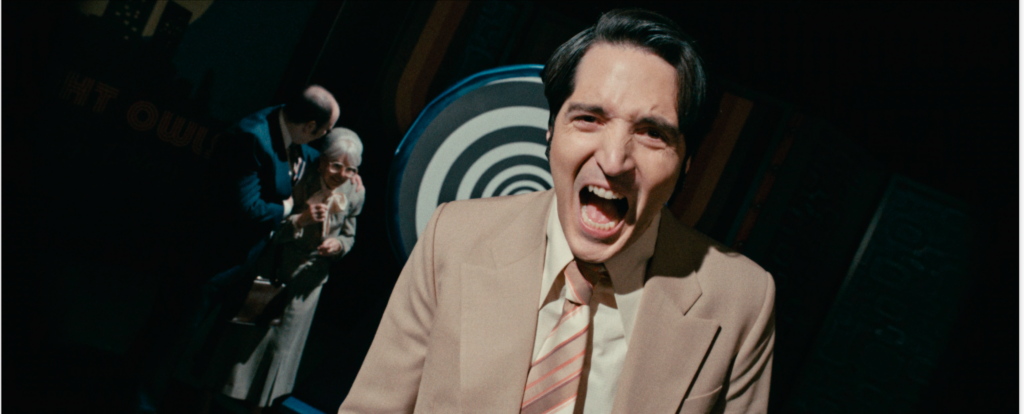
Because for him it is all about market share, right?
DD: Yes, it’s all about market share. I think that’s something most people can relate to when they go to work, or to a family gathering or show up at Thanksgiving. We all want to present fucking Instagram.
Curating ourselves.
DD: Everybody needs to present themselves—myself included. Sometimes I look at my Instagram and thank ‘Wow, I really present as if everything is just always hunky-dory.’ It’s not healthy.
Yes but you also show your real world on social. You show many facets of your life, including your family and everything you’ve gone through.
DD: I try. I want to be as authentic as possible. I think that if you don’t- well, Jack Delroy is a cautionary tale of what happens when you bury it all and don’t process or deal with it. There are many ways you can interpret this film. Did the devil possess and take over the set? Did a fractured brain not process all of his struggles, strife, anxiety, depression and trauma and finally crack? Did a nervous breakdown take place and he slaughtered a bunch of people?
Or all?
DD: All of the above could be true. But for me, David, I want to normalize all the conversations. Because everybody knows all my shit. Everyone knows I was an addict. Everyone knows I’ve struggled with depression. Everyone knows I have mental illness. For me, that’s a gift. Plus, I have the gift of gab. I’m a performer, so I’m not afraid to be in front of people and use that space to talk about these things. I think it’s one way that hopefully people out there who are struggling with things won’t feel so alone.
I love seeing you in this character because I feel I rarely see you in a front and center lead role. It’s almost as if you jumped directly into character roles.
DD: Absolutely.
Great character roles. You always have the impact of a lead.
DD: Oh, thank you!
But I loved seeing you in the front and center of this movie. And the thing I enjoyed about the performance is that this is potentially flamboyant material. There are lots of horror films, right? There are lots of effects in horror films. And this character has to ride the line between being incredulous about this, first of all. And then to also be authentic at certain points. For example, there’s a moment where you look at the playback. It is a genuinely emotional moment. There’s another moment near the end where you address the camera directly that has real impact.
DD: Yes!
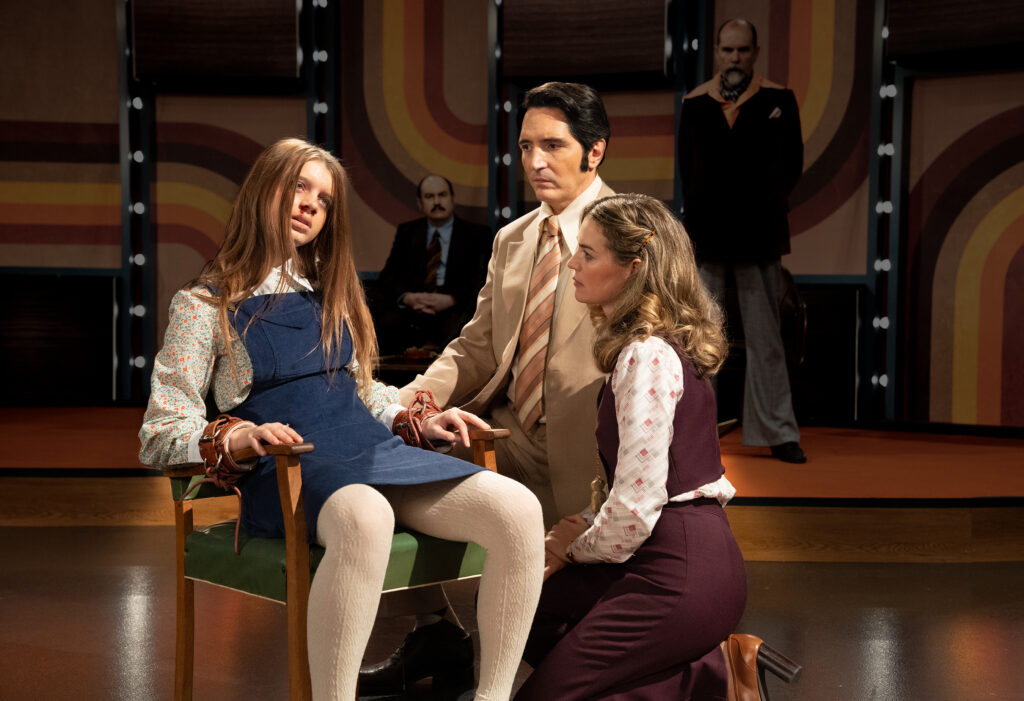
Your investment in this lead role anchors the movie and gives it gravitas. I really appreciated that here.
DD: Thank you! Coming from a foundation of having built characters on the stages of Chicago theaters I had to learn early on that to be able to keep up with the level of artistry that was going on around me in the Chicago theater scene and rise to the challenge of the kinds of texts that I was getting to navigate—including plays by writers ranging from Shakespeare to Tennessee Williams to Sam Shepard—that I had to explore and take my own chisel and putty and paint to every nook, cranny and crevice of every word. My characters spoke of every interaction that they had with every other character.
So when I started working more and more on camera I felt that it was a natural transition to bring that style of character building and work into it. What it lent itself to, for me, was getting a lot of really incredible opportunities for supporting characters who maybe had to fill up a lot of space very quickly and had to really be propulsive, like rocket fuel for the narratives and for other characters. When it came to the hero character, I always liked to imagine myself as a slingshot that you could bring in.
Like a catalyst character.
DD: Catalyst character for sure. Character actor is a badge of honor. To me, it is like being knighted. I’d love to be a one of the Peter Lorres, Brad Douriffs or Boris Karloffs. I think about John Cazale and the kind of work that an actor like that could bring to the world of film. In many respects, even though he’s been the leading man in a lot of stuff, I think of John Turturro, and also John Malkovich. I think of Steve Buscemi.
With Jack Delroy in this film, I think that anytime I have an opportunity to play a character who is on more pages or in more scenes, I just approach it the exact same way. So it’s scary for me because there isn’t always somebody that, when I think about it, I am propelling forward. And then I realize that it is every single other person that comes into a scene with me, instead of the many other times where I have propelled one person. With someone like Jack, I felt like I was the propulsion for every person that I was interacting with. It was exhausting, but it awesome.
What’s the best part about your job?
DD: The best part of my job is when things are really in their flow and all of the people collaborating with me are in a space where we know that we are conducting a kind of hyper-electric creation of something that can’t be manufactured without some kind of like alchemical element. There’s something that feels absolutely like magic. I’ve been on a movie set, on a stage or in a writing session with someone and am connecting with people to tell a story in a way that is transcendent. And even if I’m on a film set or a writing session with someone and haven’t seen it shared with an audience yet, there is something about that moment that is so magical. It’s such a high when you know that the thing you try so hard to do—and is so often elusive—is happening. It’s like a drug. It’s hard to describe. It’s wild.
You just described it.
DD: Yeah. It’s crazy!
Since I met you more than a decade ago you have firmly carved out this career that includes huge movies, right? Not just huge ones, but high-profile movies, which are a little different than maybe some of the ones at the beginning.
DD: Yeah, sure.
Do you feel nourished by this track that you’re on?
DD: Yeah. I feel really grateful for the kinds of jobs that I’m able to get as my career has grown. I’ve been so lucky that people who are so gifted have taken so many chances on me and given me opportunities to really take crazy risks with characters, and how it has all expanded. Because I’ve now been in films or on TV shows that have been seen by tens of millions of people around the world. It is a nourishment because those filmmakers aren’t just making movies seen by millions of people but also making them at the highest caliber.
Yes, some are global events.
DD: They are like incredible events made by incredible artists from whom I learn so much. And then I’m able to take and harness all of that amazing energy and funnel it into the good will of people who enjoy those things. They can then ask, ‘What other things do you have to say? What else do you want to share with us?’ And I can then connect with them and say ‘Well, if you really liked that I did this, maybe you would also like that I wrote this comic book, or maybe you’d like to take a look at this small, independent, no budget film I made, and maybe you’ll give me a chance now.’ People are more willing to give me a chance if they’re like, ‘Oh, you’ve worked with X, Y and Z director or been in X, Y and Z superstar studio film.’ It’s just the nature of the business; people are more willing to give me the benefit of the doubt, I think. And that’s a gift that don’t take it lightly. I try my best to hopefully always deliver work that honors that; not for a second do I take it for granted.
I assure you that there are actors who are heads and shoulders more talented than I am. On the writing spectrum, there are people who are entire lengths of giraffes higher and more talented than me. And there are people with more interesting looks who are delivering spilled coffees in their cars tonight making Uber deliveries. I am just so lucky. So lucky. I feel like I won the lottery a number of times over.
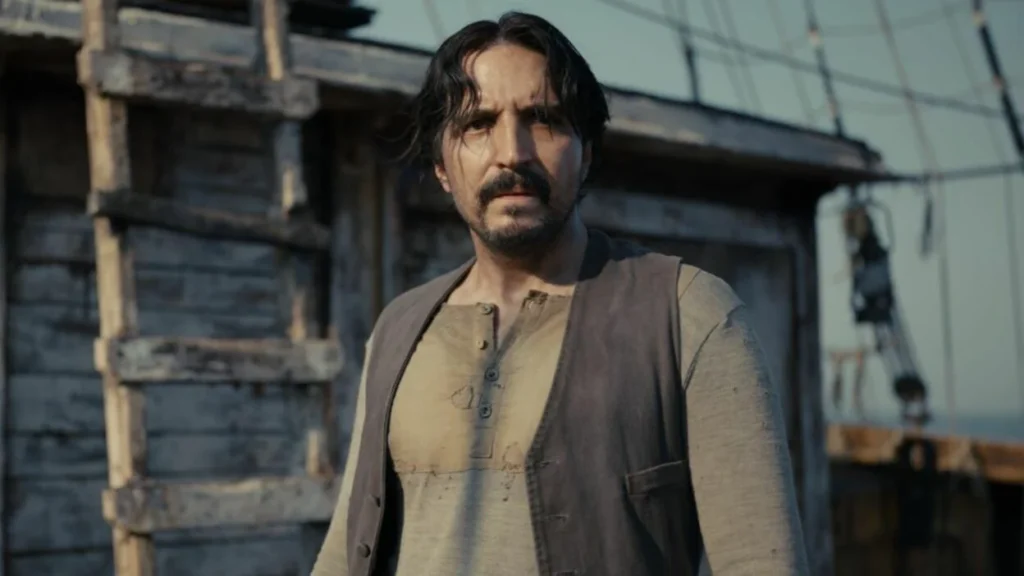
I saw you in four films last year but was particularly taken with your performance in The Last Voyage of the Demeter. Talk about investing a genre character with real substance. It may have been a vampire film, but you have a final reel scene with Corey Hawkins was substantively acted, to say the least. Do you recall that moment?
DD: Yes! Facing the end of things and thinking about sacrifice. Our characters were putting a rivalry behind them at that moment and figuring out how the hell they were going to survive.
There were narrative revelations on both your parts that elevated that movie. And I thought that was a great testament to you. You take what could potentially appear to be a genre character on the page and push it higher. I admire that you can take that ball and run with it.
DD: Thanks! Yeah. It doesn’t it doesn’t matter if it is a genre film because death is death. And you there’s nothing light about that. Confronting it is so hard. And it’s something we have got to talk more about. When I do it as an actor, it can be hard because it sometimes makes my body feel like I’m actually really facing it, which is scary.
That’s why it feels authentic. Thanks for catching up today.
DD: Thanks, man. That was awesome.
This interview has been edited for length and clarity.
IFC Films’ Late Night With the Devil opens in select theaters on March 22.
